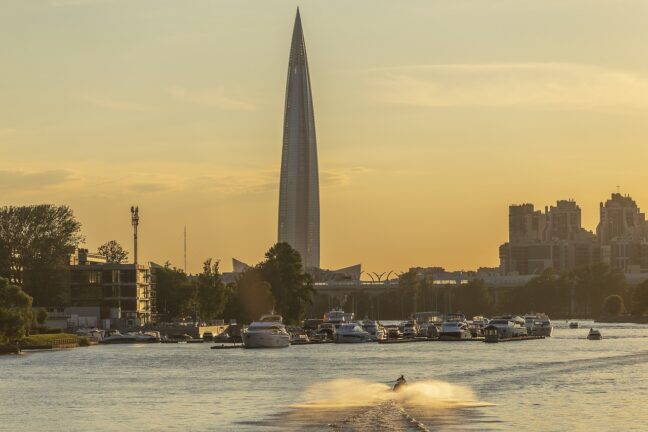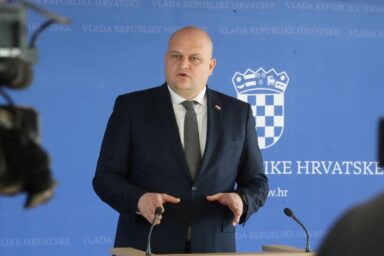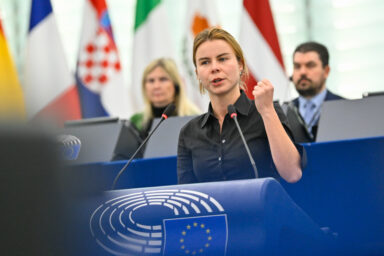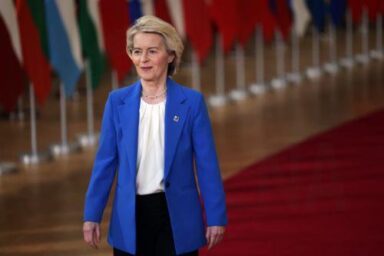Current limits on imports of Russian energy and related products are not sufficient to bring Moscow to heel, European parliamentarians admit. Floated ideas about additional bans, however, are fraught with hidden dangers — and the risks would rest on European shoulders, even Russia hawks acknowledge.
EU lawmakers are tightening economic pressure on Russia by targeting new vulnerabilities, among them stored natural gas and fertiliser imports. The measures aim to cut revenue streams funding Russia’s war in Ukraine.
Too much reporting
MEP Andrea Wechsler (EPP/DEU), who engages in negotiations over the European Parliament’s energy and trade committees’ amendments, argued for bans on storing Russian natural gas and importing fertilisers made with Russian gas. These would supplement existing European Commission proposals to phase out Russian fossil fuels. Some MEPs also demand a permanent oil ban and stricter anti-circumvention rules.
Even the proponents, however, are wary of risks, warning the Commission’s plans would impose excessive reporting burdens on non-Russian fossil-fuel importers. “Russia has weaponised natural gas supplies for years, and still funds its war with European energy payments,“ tweeted Ms Wechsler in July. “I fully support phasing out Russian gas imports by 2027. But we must do so legally sound and economically smart for our people and our industries,“ she wrote.
This week, the German lawmaker’s warning was more specific. “This (measure) would present reporting burdens which are disproportionate to its stated objective of targeting Russian-origin gas,” she told the news site MLex.
You might be interested
Gas in another form
Logically, the volume of imported non-Russian gas will grow. The EU is boosting liquefied natural gas imports from the US and easing methane reporting rules, said EU Energy Commissioner Dan Jørgensen this week after meeting US Energy Secretary Chris Wright. Cooperation on nuclear energy will also deepen.
Another item awaiting tougher measures is fertilisers. In May, the European Parliament approved phased tariffs on Russian and Belarusian nitrogen fertilisers, rising incrementally to €430 per tonne by 2028. Russia—a major urea-based fertiliser supplier—has undercut EU producers using subsidised gas, making European farmers increasingly reliant on its exports. Fertiliser sales reportedly earned Russia €1.5bn in 2022-23, with funds allegedly funnelled into military operations.
I fully support phasing out Russian gas imports by 2027. But we must do so legally sound and economically smart for our people and our industries. — MEP Andrea Wechsler (EPP/DEU)
Lawmakers now argue fertilisers represent “gas in another form”, as gas is a key production input. The move aims to safeguard EU agricultural sovereignty, reduce dependency and align with climate goals, as EU-made fertilisers are less carbon-intensive.
Times are a-changing
In parallel, the Council of the European Union extended gas-storage rules until 2027, requiring member states to fill 90 per cent of storage capacity before winter. Deadlines were relaxed: targets can now be met between 1 October and 1 December, versus the previous 1 November cutoff. A 10 per cent tolerance for filling difficulties was added, with the Commission authorised to grant an extra five per cent leeway in crises.
The 2022 gas-storage regulation—enacted during acute energy shortages triggered by Russia’s invasion—no longer fits current realities, critics argue. EU dependence on Russian gas has plummeted as supplies diversified and renewables expanded. Yet lawmakers insist maintaining storage safeguards remains prudent amid global volatility.
These steps form part of the EU’s proposed 17th sanctions package, signalling sustained economic pressure on Moscow. Debate continues over balancing enforcement rigour with market practicality.











